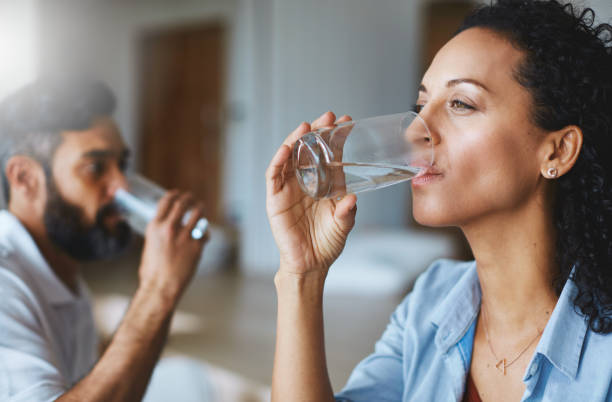By Deborah Bamisaye
“Give me another glass of water please.”
“What are you doing? That would be the 4th glass, are you that thirsty?”
“Not really! But you know, water is life and it’s good to take water, at least 5 liters a day.”
“Says who?
“As how? You want to tell me you don’t know this thing? More glasses, I beg.”
“Hmmm, na wa o! 5 Litres?”
Drinking Art:
The truth is water is essential to life, but mastering the art of its intake is key to unlocking lasting wellness. Proper hydration goes beyond simply drinking enough water; it’s about timing, quantity and quality.
First and foremost, understanding your body’s unique needs is crucial. Factors like age, activity level, climate, and health conditions influence daily water requirements. Rather than gulping large amounts at once, sipping water steadily throughout the day helps maintain hydration balance and optimizes absorption.
Secondly, the quality of water matters. Clean, mineral-rich water supports bodily functions better than sugary or artificially flavored drinks. Incorporating water-rich foods like fruits and vegetables further enhances hydration.
Hydration benefits digestion, skin health, energy levels, and cognitive function. It supports detoxification and can prevent chronic ailments linked to dehydration.
Mastering this art involves listening to your body, cultivating consistent habits, and making water a cornerstone of a healthy lifestyle. In doing so, you nurture both body and mind for sustained vitality and wellness.
1. Cold Water? What About It?
– Cold water can constrict blood vessels, slowing digestion and nutrient absorption.
– It may cause the body to expend extra energy to maintain normal temperature.
– Drinking cold water can irritate the throat, worsening soreness or respiratory issues.
– Cold water after heavy meals or exercise may cause stomach cramps or discomfort.
– Warm or room-temperature water supports better digestion and circulation.
– Being mindful of water temperature improves hydration and overall health.
Avoiding cold water at certain times helps enhance your wellness.
Cold? Not at this time!
Avoid Completely:
– After heavy meals: Warm or room-temperature water aids digestion, while cold water can slow it down and cause cramps.
– Post-exercise: Cold water may shock the system; lukewarm water helps gradually rehydrate and balance body temperature.
– When prone to sore throat or respiratory issues: Cold water may irritate tissues, so warmer water is gentler.
– In cold weather: Warm water helps maintain body heat and circulation.
Timing water temperature thoughtfully supports overall health and comfort.
2. Drinking Water during Meals – Medical Perspective:
Contrary to old beliefs, drinking water during meals does not dilute stomach acid or impair digestion significantly but the amount taken during meals matters. So, taking water during meal:
- Aids Digestion – Water softens food and dissolves fiber, promoting better nutrient absorption and preventing constipation.
- Prevents Overeating – Drinking water creates a feeling of fullness, helping control portion sizes and supporting weight management.
- No Significant Impact on Stomach Acid – Water does not significantly dilute stomach acid or impair digestion, contrary to common belief.
- Helps with Swallowing – Water assists in swallowing food and moving it smoothly down the esophagus for comfort.
- But there is an Exception – In cases of acid reflux or GERD, large amounts of water may cause discomfort by increasing stomach pressure, but small sips are usually safe.
I’m glad you now know that moderate water intake during meals supports digestion and satiety without harmful effects for most people. Those with specific digestive conditions should seek medical advice.
3. Not Drinking Water Before Bed:
– Avoid drinking large amounts of water just before bed to prevent frequent urination that disrupts sleep.
– Poor sleep from waking to urinate may increase risk for cardiovascular problems and fatigue.
– Proper hydration overall is essential, but timing matters for uninterrupted sleep.
4. Gulping water – Sip it, Mean it:
– Drinking too much water too quickly may risk water poisoning, disturbing electrolyte balance and causing symptoms like headache and confusion.
– Excessive quick intake can cause brain cells to swell, which is life-threatening.
– Sipping water slowly is generally better for hydration and reduces unnecessary urine production.
5. The 8 Glasses a Day Water Myth:
– The “8 glasses a day” rule lacks strong scientific evidence.
– Daily water needs vary per individual based on factors like diet, climate, and activity.
– For most people, the body signals thirst to guide water intake adequately.
– Other foods and beverages contribute to hydration too.
Nigerian doctors and their advice on proper water drinking:
– Nigerian health experts emphasize the importance of regular water intake for digestion, preventing dehydration, and organ function.
– There are myths in Nigeria about water overdose and timing, but experts like Dr. Alero Roberts highlight water intoxication is extremely rare.
– Drinking water regularly, not necessarily in excess or only when thirsty, supports health.
Also, emphasis is on the critical importance of staying hydrated, especially given the country’s hot climate and recent heatwaves. Dr. Gabriel Ameh, a public health physician, advises Nigerians to consistently drink plenty of water to avoid dehydration, heat exhaustion, and related health risks such as strokes and cardiovascular issues. He also recommends avoiding strenuous activities in the heat, wearing light clothing, and using cooling methods when power supply permits. The message is clear: keeping the body hydrated, this is essential for health and preventing medical emergencies during harsh weather conditions in Nigeria.
To ensure adequate water intake:
– Drink regularly throughout the day, not just when thirsty, but avoid excessive gulping.
– Adjust intake based on activity, climate, and health conditions.
– Include water-rich foods like fruits and vegetables.
Any Recommendations:
Recommended daily water intake (from all fluids and foods) is approximately:
– Men: about 13 cups (3.7 liters)
– Women: about 9 cups (2.7 liters)
Children’s needs vary by age, roughly 4-8 cups.
Please note that these guidelines are general; individual needs vary by factors like exercise, environment, and health status. The popular “8 glasses a day” is a simple target but not one-size-fits-all things.
So, the question is, have you mastered the art of taking water for lasting wellness? Oh, that’s Great!





